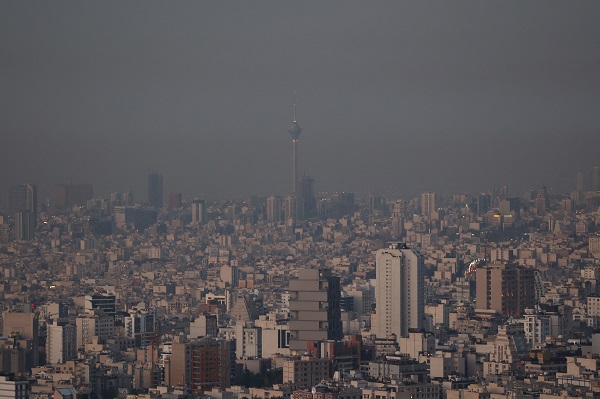 A general view of Tehran after several explosions were heard, in Tehran, Iran, 26 October 2024;
Credit: Majid Asgaripour/WANA (West Asia News Agency) via Reuters
A general view of Tehran after several explosions were heard, in Tehran, Iran, 26 October 2024;
Credit: Majid Asgaripour/WANA (West Asia News Agency) via Reuters
DUBAI/JERUSALEM (Reuters) - Israel struck military sites in Iran early on Saturday 26 October 2024, saying it was retaliating against Tehran's strikes on Israel this month, the latest attack in the escalating conflict between the heavily armed rivals.
Hours later the Israeli military said its strikes had been completed and its objectives achieved, but a semi-official Iranian news agency vowed a "proportional reaction" to Israeli moves against Tehran.
Iranian media reported multiple explosions over several hours in the capital and at nearby military bases, starting shortly after 02:00 (22:30 GMT on Friday).
Before dawn, Israel's public broadcaster said three waves of strikes had been completed and that the operation was over.
Iran said its air defence system successfully countered Israel's attacks on military targets in the provinces of Tehran, Khuzestan and Ilam with "limited damage" to some locations.
The Middle East has been on edge awaiting Israel's retaliation for a ballistic-missile barrage carried out by Iran on 1 October 2024, in which around 200 missiles were fired at Israel and one person was killed in the West Bank.
Tensions between arch rivals Israel and Iran have escalated since Hamas, the Iran-backed Palestinian militant group based in Gaza, attacked Israel on 7 October 2023. Hamas has been supported by Lebanon-based Hezbollah militants, also backed by Iran.
Fears that Iran and the US would be drawn into a regional war have risen with Israel's intensifying assault on Hezbollah since last month, including airstrikes on the Lebanese capital Beirut and a ground operation, as well as its year-old war in Gaza.
"In response to months of continuous attacks from the regime in Iran against the State of Israel – right now the Israel Defense Forces is conducting precise strikes on military targets in Iran," Israel's military said in a statement announcing the attack.
"Obligated to respond"
The military said later it had completed its "targeted" attacks in Iran, striking truck missile manufacturing facilities and surface-to-aerial equipment, adding its planes had safely returned home.
"If the regime in Iran were to make the mistake of beginning a new round of escalation, we will be obligated to respond," the military said.
Targets did not include energy infrastructure or Iran's nuclear facilities, a US official said.
US President Joe Biden had warned that Washington, Israel's main backer and supplier of arms, would not support a strike on Tehran's nuclear sites and has said Israel should consider alternatives to attacking Iran's oil fields.
Iranian authorities have repeatedly warned Israel against any attack.
"Iran reserves the right to respond to any aggression, and there is no doubt that Israel will face a proportional reaction for any action it takes," the semi-official Tasnim news agency said on Saturday, citing sources.
A senior Biden official said Israel's "targeted and proportional strikes" should be the end of direct exchange of fire between the two countries, but the US was fully prepared to once again defend Israel if Iran should choose to respond.
The US has multiple direct and indirect channels of communication with Iran where it has made its position clear, the official said on condition of anonymity.
US informed ahead of strikes
Videos carried by Iranian media showed air defences continuously firing at apparently incoming projectiles in central Tehran, without saying which sites were coming under attack.
The semi-official Tasnim news agency said Islamic Revolutionary Guard Corps bases that were attacked were not damaged.
A spokesperson for Iran's Civil Aviation Organization said flights on all routes were cancelled until further notice, state news agency IRNA reported. Neighbouring Iraq also suspended all flights until further notice, its state news agency said.
Israel targeted some military sites in Syria's central and southern parts with airstrikes early on Saturday, Syrian state news agency SANA reported. Israel has not confirmed striking Syria.
Israel said Prime Minister Benjamin Netanyahu, Defence Minister Yoav Gallant and other security officials had closely followed the operation at the military's command and control centre in Tel Aviv.
Gallant spoke to US Defense Secretary Lloyd Austin shortly after Israel's strikes began.
Austin emphasised the enhanced force posture of the United States to defend US personnel, Israel and its partners across the region, the Pentagon said.
Israel notified the United States before its strikes, but Washington was not involved in the operation, a US official told Reuters.
US Secretary of State Antony Blinken, in the Middle East for another attempt to broker a peace deal, said on Wednesday 23 October 2024 that Israel's retaliation should not lead to greater escalation.
Even as it sought to convince Israel to calibrate its strikes, the United States moved to reassure its closest ally in the Middle East that it would aid in its defence should Tehran decide to stage a counter-attack.
This included Biden's decision to move the US military's THAAD anti-missile defences to Israel, along with about 100 US soldiers to operate them.








